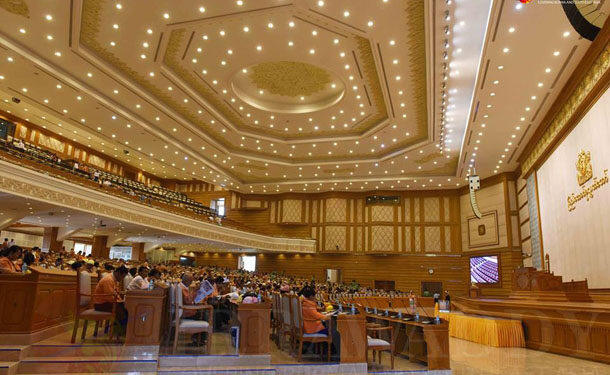RANGOON — A new bill that would rescind Burma’s 1975 State Protection Law is likely to be submitted to Parliament after it reconvenes next week, the Lower House’s Bill Committee chairman said on Thursday.
The law on the chopping block, also known as “Lower House Parliament Law No. 3, 1975” or the far more verbose “Law to Safeguard the State Against the Dangers of Those Desiring to Cause Subversive Acts,” was enacted during the country’s socialist era.
The chairman of the Lower House’s Bill Committee, Tun Tun Hein, told The Irrawaddy on Thursday that such legislation should be revoked as the law itself violates the fundamental rights of citizens and is not compatible with democratic standards.
“This law was enacted during the socialist era and the situations [of the country] are now different,” said Tun Tun Hein of the ruling National League for Democracy (NLD), whose party dominates the legislature.
“The Parliament will enact laws that have advantages for the public, will revoke those that oppress its own citizens and will amend those that have flaws,” he continued.
The core purpose of the State Protection Law was “to prevent the infringement of the sovereignty and security of the Union of Burma against any threat to the peace of the people, and against the threat of those desiring to commit subversive acts causing the destruction of the country, without impeding citizens’ fundamental rights,” according to its preamble.
But lawyer Ko Ni, who advises the NLD on legal matters, said the law supported the “one party system” of Burma’s socialist government and was used to oppress political activists who did not share the same opinion or vision of the government.
“Such a law is absolutely unnecessary for the current government’s multi-party democratic system,” he said.
According to Articles 7 and 8 of the law, the ruling cabinet has the right to form a “Central Board” led by the ministers of Home Affairs and Religious Affairs, with the ministers of Defense and Foreign Affairs granted subordinate membership. The law allows the board to pass orders “restricting any fundamental right of any person suspected of having committed or believed to be about to commit, any act which endangers the sovereignty and security of the state or public peace and tranquility.”
Zaw Win, a member of the Bill Committee, told The Irrawaddy that the committee is currently in discussions with military officials and hearing their recommendations as the law pertains to the ministers of Home Affairs and Defense, both of whom are directly appointed by the army commander-in-chief.
Ko Ni said many senior figures from the NLD, including Aung San Suu Kyi, Tin Oo and Kyi Maung, were oppressed on multiple occasions by this law during Burma’s former military regime.
Despite that fact, the lawyer said he thought the military would find no reason to oppose the new bill revoking the controversial State Protection Law if its leadership genuinely supported the government’s pro-democracy agenda.
The law was slightly modified by the military government in 1991. If the new bill wins a majority in Parliament, it would be the second legislative achievement of the body after Suu Kyi’s State Counselor Law, which was discussed and approved in early April.
Passing a revocation of the 1975 law could mark the first of a flurry of similar legislative initiatives by Parliament: Following a review, its Legal Affairs and Special Cases Assessment Commission recommended earlier this month that 142 laws currently on the books be abolished, amended or rewritten.

















